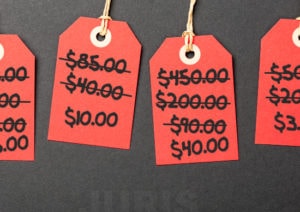An “estate sale” (also referred to as a “tag sale”) usually involves someone hired by an executor who will “price” each item with a tag. Most estate sale attendees will assume that there is room to negotiate (because there is), so a fair amount of items marked with a price tag will sell for less. Estate sales are usually spread over several days, where prices are lowered on each subsequent day, sometimes drastically.
Usually, at an estate sale, a fair share of the items simply do not sell. Fortunately, there is a far more effective alternative. That alternative is an estate auction.
With an auction, the executor will hire a professional auction company to sell estate property “to the highest bidders.” Most auction attendees know that items will be sold to the highest bidder, and that they will win each item where they outbid all the others. When personal property is sold at auction, there are typically no set prices, and the market sets the selling prices. Typically, at an auction, all the items will sell.
So what are the key differences between an estate sale and an auction?
- An estate or tag sale uses a price discount model where items sell for – at most – the price tagged on the item, or less.
- An auction sale utilizes competitive bidding where items sell for whatever the highest bidder is willing to pay. There is no price ceiling with an auction.
Another key difference between an estate sale and an auction is that the estate sale service provider must be an expert in everything, which just isn’t possible. In other words, they would have to know how to price every single item being offered, or suffer less than optimal results. Unlike an estate sale service, an auction company’s auctioneer relies on competitive bidders to realize true market value.
Consider this example. An estate has a unique, handcrafted item. At an estate sale, how is the estate sale company going to price this one of a kind, unique item? This dilemma reveals the fundamental flaw in estate sale services:
- If the item is under priced, it will sell for less than true market value.
- If the item is over priced, it will not sell at all.
The same item, offered at auction, will sell. It will sell to the highest bidder. What will it sell for? It will sell for whatever it is worth – true market value.

There are other downsides to estate sales that most estate liquidators will not tell you:
1. As much as 80% of items in an estate sale are sold below market value.
2. Upwards of 20% of items in an estate sale will remain unsold.
3. 100% of items will sell for no more than the “tagged” price.
4. You will not know how much each of your items were sold for. That’s because most estate sale providers only record the higher priced items. That could leave thousands of dollars unaccounted for.
5. Often, items are under priced so that dealers, family, or friends of the estate sale service can get them cheap.
6. Some estate sale firms over price some high end items until the final day of the tag sale, and then they contact other dealers, friends or family, and discount those items especially for them.
7. Almost always, the estate sale company does not have the expertise to properly price all items, so full value pricing is never accomplished.
8. Regulation and licensing of estate liquidators is virtually non-existent in the U.S. A seller who is taken advantage of has little recourse but to take the estate sale company to court.
A professional auction generates true market value quickly
Here are the upsides to an estate auction:
1. You receive a list showing every single transaction.
2. There is no price ceiling.
3. Auctioneers are highly regulated.
4. Estate Auctions last a few hours, not 3 days.
5. Auctions provide competitive bidding.
6. Auctions generate true market value. An auction attracts willing and able buyers, through extensive marketing, who must all compete to purchase items they desire. Full price discovery is accomplished, nearly all items sell, and all items sell for market value.
7. You can also sell real estate at auction, for 0% commission. That means you keep 100% of the high bid.
To learn more about the advantages of a professional estate auction, and to get a free evaluation of your property’s auction potential, contact Juris Auctions at 1-901-254-8200.

